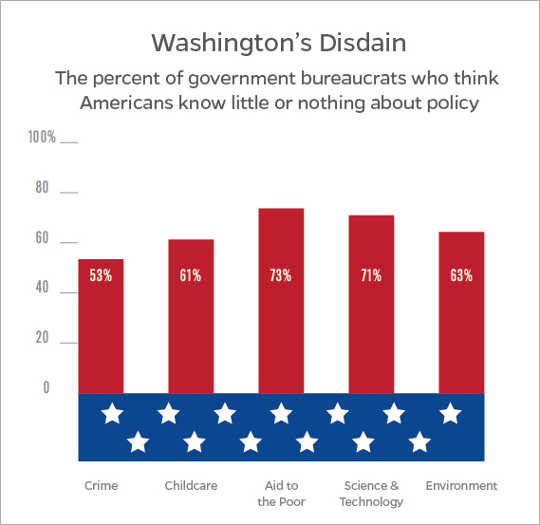
Washington doesn’t think very highly of the American people, a study of 850 non-elected officials and others working in the nation’s capital concludes.
These Beltway insiders, who make policy or regulations or craft legislation in federal agencies, on Capitol Hill and in other Washington jobs, tend to think Americans are uninformed, know “very little” about key issues, and have opinions that can be ignored.
 (Credit: Greg Stanley/Johns Hopkins)The findings appear in a new book, What Washington Gets Wrong: The Unelected Officials Who Actually Run the Government and Their Misconceptions about the American People (Prometheus Books, 2016), by Jennifer Bachner and Benjamin Ginsberg, political scientists at Johns Hopkins University.
(Credit: Greg Stanley/Johns Hopkins)The findings appear in a new book, What Washington Gets Wrong: The Unelected Officials Who Actually Run the Government and Their Misconceptions about the American People (Prometheus Books, 2016), by Jennifer Bachner and Benjamin Ginsberg, political scientists at Johns Hopkins University.
“Official Washington is wealthier, whiter, and better educated than ordinary citizens. It lives in its own inside-the-Beltway bubble.”
“This disdain for the public results from the wide gulf between the life experiences of ordinary Americans and the denizens of official Washington,” the authors say. “Official Washington is wealthier, whiter, and better educated than ordinary citizens. It lives in its own inside-the-Beltway bubble, where Washingtonians converse with one another and rarely interact on an intellectual plane with Americans at large.”
In a 2013 survey, the authors found people who either work in government or directly with it not only have very little in common with other Americans, but also have a disturbingly low opinion of them.
They found 73 percent of government officials think the public knows little or nothing about programs aimed at helping the poor, 71 percent think the public knows little or nothing about science and technology policy, and 61 percent think the public knows almost nothing about childcare.
In fact, when it comes to fundamental policy areas like social security, public schools, crime, defense, and the environment, it was hard to find government officials who thought the public knew “a great deal.”
Having concluded that Main Street Americans know so little, government officials tend to use their own judgment rather than real people’s when making policy decisions, the authors write. On issues of science and defense, more than half of officials think they should “always” or “mostly” heed their own opinions. With crime, welfare, and the environment, at least 42 percent of officials feel the same way.
Government officials actually tended to believe their own views diverged more from those of ordinary Americans than they actually did. For example, 76 percent of officials believe they disagree with average Americans on half of the policy areas surveyed, but only 12 percent of them really do. The data on “average Americans” is largely drawn from the 2012 American National Election Study.
“This sense of “false uniqueness” reflects a sense of cultural or intellectual superiority,” the authors write. “The officials tend to view the citizenry with a considerable amount of disdain.”
Other findings
- 91 percent of those who work for federal agencies are white, versus 78 percent of the public.
- In 2012, federal workers compensation averaged $81,704, or 48 percent more than the private sector average of $54,995, according to the US Bureau of Economic Analysis. That puts federal workers in the top 10 percent of American earners.
- Washingtonians read the news at least five days a week compared with about three days a week for the rest of the country.
Bachner is director of the Master of Science in Government Analytics program. Ginsberg is a professor of political science.
Source: Johns Hopkins University
Related Books:
at InnerSelf Market and Amazon






























